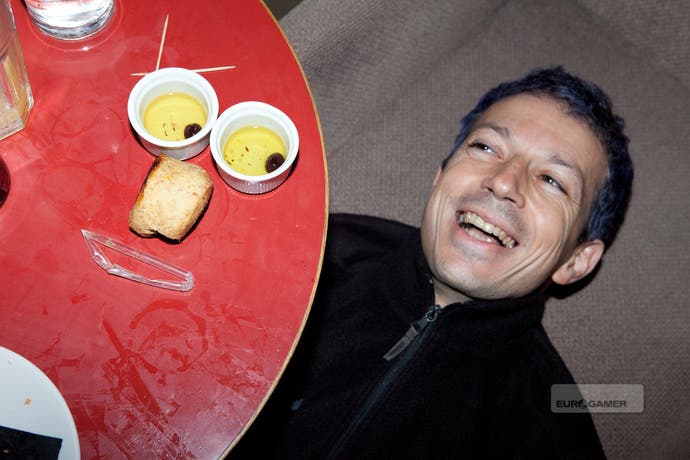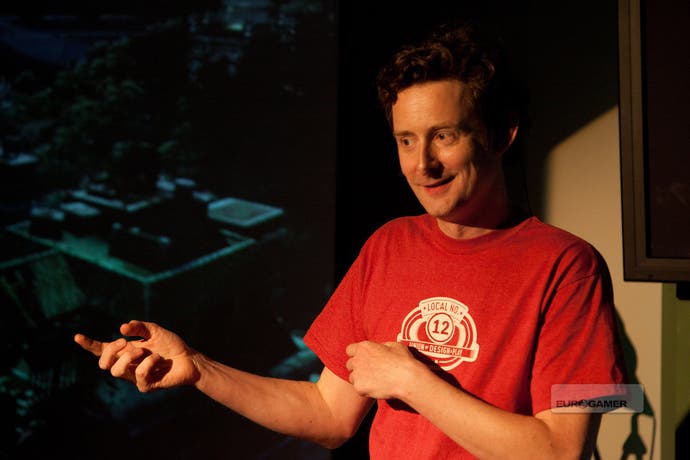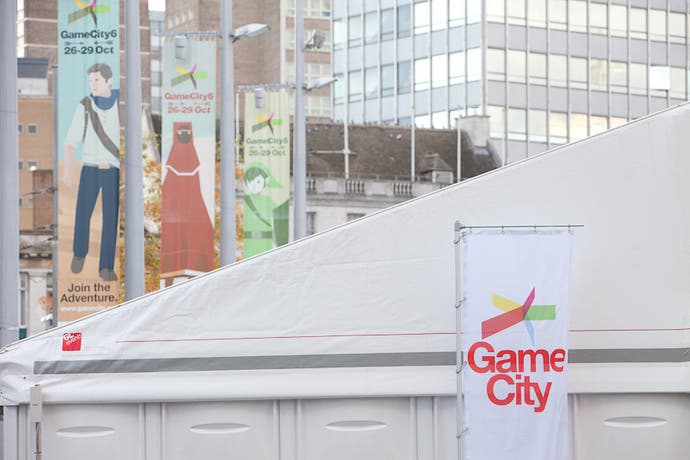GameCity Discussions: Richard Lemarchand & Eric Chahi
From Dust and Uncharted creators captured in conversation.
Nottingham doesn't have the swagger of Los Angeles or the neon allure of Tokyo, but it can boast a games show that puts E3 and TGS to shame. GameCity is a festival in the truest sense of the word, a celebration of a community and a culture that's sadly all too often swamped by corporate concerns.
It's a meeting point for those who love games and those who love making them, and a melting pot for some strange collaborations and contrasting approaches to the medium. We'll bring you discussions between key creators, allowing you to eavesdrop on some of the industry's finest as they exchange ideas. Here, in the first of a short series, Naughty Dog's Richard Lemarchand is captured in conversation with Eric Chahi, creator of From Dust and Another World.
"It's not a box of cornflakes." - On celebrating games.
When I joined the industry when I was 22, I swore that I'd never refer to a game that I was working on as a product.
Yes! I'm always fighting - don't say it's a product! Product is a term that I hate. It's not a box of cornflakes.
It's a piece of culture. I'm so glad to hear that we have that in common. You're very candid in whatever you do, and I strive to be as well - and I think most everyone at Naughty Dog does. Anyone who reads an interview with you can tell when it's just hot air, and I think it's very important to know that... Gamers are so sophisticated, and so interested in how games are made that we really owe it to them to be straight about the challenges that we face, about the triumphs and challenges that we face.
I showed something [at GameCity] that I'd never shown before, and something more personal, about volcanoes. It's a real place to share.
Yeah, it really is. It's nice, and they create space for us to do that at GameCity. The sessions allow us as game designers to speak about our games in a more expansive way. And to be able to talk about personal things that informed our game design, in the way you showed your pictures from Mount Etna.

But it's not always easy. Games development is hard. Always.
Really hard. I love how Phil Fish [creator of Fez], it's his chorus at GameCity. Phil says what we all think - making games is so hard.
I've had only one game development that wasn't hard. That was Future Wars. Before Another World, I don't know if you remember, I wrote an Amiga game that was done by Paul Cuisset. He was looking for an artist and an animator, so I did it - and I did only this, and I didn't do any other game design or programming. I only did this, and it was a pure vision. I was doing my art, and I'd bring it to Paul and he'd say 'okay, that's perfect'. And that was it. There was no conflict.
Any time when you're central to the drive of a process it's a struggle. And I think that's true of most creative endeavours.
Even when we are alone - for Another World it was a struggle, with the technology and with the time.
I really enjoyed something you said yesterday that was extremely intriguing. You said the process of making the game was reflected in the content of the game. I thought that was really intriguing, and in the way that when you were making Another World you were on your own, just as Lester [the game's lead character] is one person. Although he does make one friend in the game, and I'm sure you had your own friends around you then.
It was more that I needed a friend then.
Oh! And you had to invent one.
I had friends around me, but in terms of games development I was alone.
"It's like throwing a party." - On personal games, and games with personality.
A lot of that personality in Uncharted really comes from the development team.
A game is made by people, and the games reflect those people, definitely.

Yes, the personality of the creators of any type of creative work imprints itself on the work, and in subtle ways that aren't always straightforward. I was really glad that I got the opportunity during some of the panels to say when somebody said they thought that 'Marco Polo' moment in the rooftop swimming pool in Uncharted 2 made them feel very playful, I remember that we put that in because we were feeling playful ourselves. It was close to the end of development, and we had this little idea that didn't take too much work to make it happen.
We were kind of doing it to delight ourselves as much as we were doing it to delight the audience. I think that's quite an important concept. I remember as a game designer, working at quite a big games company - not Naughty Dog, a different company - and sometimes the people in charge of the company would say you have to think about the market when you're making games.
There's a degree to which that's true. You've got to be fairly confident that there will be some sort of audience for a game that you're making with other people's money, in particular. But I've always thought that it's important to in some sense be making a game for yourself and your friends.
Yes, exactly. The first thing is to make a game for you - if you can take pleasure from it, it's a good point. In a way, we're normal people. OK, we know more about game development, but we're still game players, and the only risk is that we're too used to the games we're creating. You have to be able to step back.
And they say that this is one of Miyamoto's great skills, and maybe even his core skill as a games developer. He's able to come in to work one morning, and even if he's been working on a project for two years he can see it as if he's seeing it for the first time.
That's a very important point. There's something you were saying with Tale of Tales [creators of The Path and guests at GameCity], about the struggle between video games and the interactive thing. There was a conflict between the video game and the rest of the interactive thing, but I think it's more blurred.
I agree.
There was a discussion about the mechanics. That there are very traditional game mechanics - collecting, goal, reward etc. - and above this, the most important thing is what you express with it.
I do agree. Video games are a very expressive medium, and sometimes we get confused about that because they're not fixed or static as artifacts. They are spaces of possibility, and it's up to the player to find their own path through that space of possibility, just as there are many different ways to play a game of chess.

Yes, and gaming is the exploration of a space of possibility. It's why games are so fascinating. And it's possible to do it without a traditional gaming mechanic.
I sometimes think that it's like throwing a party. A party is a space of possibility, and the person hosting the party only has so much control over what's going to happen there - but they can influence the party by adjusting the lighting, or playing certain music or putting games or toys in the environment or what type of food and drink they serve. And I think that's where the expressive power of video games comes in, because even though it's a space of possibility, it's still bound and constrained.
I love your metaphor with the party. And the difference with reality is that with the game you can restart the party and change the parameters. You can bring spicy pizza instead, and then you can compare different evolutions. Do you know Façade? It's like that - you can explore the possibilities.
"The audience has changed." - On diversity and maturity in today's industry.
When I first heard about From Dust, I was excited about hearing that you were exploring a space that was quite new for you.
Yes, it was very new, playing with a simulation that was quite a challenge.
The fact that the world of video games can encompass both Uncharted and From Dust is a wonderful sign of where we're at with video games.
There's a place for everything.
"There is a difference of maturity from today's player, and it's true that twelve years ago some minimalist game would be criticized, but today it's totally accepted."
Eric Chahi
There's a generation now that has always known video games. I played my first game when I was five, and so they've always been a part of my cultural vocabulary - which means that now, when I'm someone in my early forties, I can intermesh my conceptions about video games with my conceptions about other cultural forms like the novel or cinema in the case of Uncharted. Or even classical music or pop music or poetry - all these things can start blurring together in a way that can points in some amazing directions.
You say that there is a maturity, a difference of maturity from today's player, and it's true that twelve years ago some minimalist game would be criticized, but today it's totally accepted. Ten years ago there was the run for realism, for 3D and the 2D games were something totally old-fashioned.
No publisher wanted to put them out, but now 2D games are this incredibly expressive medium.
And with success. The audience has changed.
Yes, which gives me such hope. This idea that audiences are now mature, it opens the door for games to really blossom, and partly because of commercial reasons. It was very intelligent of Ubisoft to want to create a game like From Dust, and we're lucky at Sony that they're happy to support thatgamecompany, and the way that TGC are pushing the boundaries of what's possible with video games with Flow and Flower and Journey. Everyone understands now that there's an audience for games that are more artful, and more thoughtful.
"It'd be great to have this massive collaboration." - On gaming thirty years from now.
You see this floor - is it flat? But if I drop the water on here it will go over here or over there. It's too flat for me, but I can't see what it will be in thirty years. I think maybe something with the screens - these thick screens will disappear, and we'll go to soft screens. And if you do that the notion of frame will disappear, so you'll have several things you can put together and have this really malleable thing.
"Games are spaces of possibility, and it's up to the player to find their own path through that space of possibility."
Richard Lemarchand
I love that idea, and maybe it'll play into the notion of ubiquitous computing. Microprocessors have been in many of our day-to-day artefacts for a few decades now. Look around this room and there's definitely a microprocessor in the keyboard, one in the calculator over there. I carry a mini-computer in my pocket, and one day there'll be microprocessors in doorknobs. They'll have many practical uses, but they'll also open up possibilities for playfulness.
Maybe we'll have the floor, and the carpet will be pixels that could change.
I've always wanted a room where the wallpaper is a pliable screen, so the whole room is animating, and it could be a shifting grid of pixels. There's a thing in virtual reality called the CAVE, and it's a cubicle where the ceiling, the walls and the floor are all screens, so you can project a virtual environment. I've always wanted that in my living room. It'd be good to play up the wall and across the ceiling.

It'd be great to have this artificial, evolving system in your place, and you'll have some really stunning piece of work in the future that will involve some massive collaboration. It'd be great to have this massive collaboration.
One of my college friends, Lewis, introduced me to the idea ten years ago that if we could harness the intelligence and industry of game players, we might be able to put that to practical use. He was so far sighted, because of course we have the Folding at Home project where we very recently solved a major problem in the life sciences about protein folding. Do you know about this?
No, no I don't.
There was a breakthrough in terms of understanding the structure of a certain type of virus, which came from the collaborative efforts of many players playing with this game system. And the game system stimulates that a string of RNA is folded up, and in our understanding of viruses the way that proteins get packed down into very compact shapes is a very difficult problem. That can be solved by players interacting with a system.
That's very exciting stuff.
Eric Chahi and Richard Lemarchand were talking at GameCity 6. Thanks to Chris White for arranging the opportunity.

